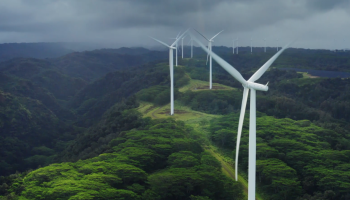

Enel Green Power España wind plant Los Arcos, Malaga
ohnson & Johnson has reached the milestone of 100% renewable electricity for its operations in Europe. This means that Johnson & Johnson is now producing or procuring the equivalent of 100% renewable electricity for all Company sites across 12 countries.* This achievement brings us a step closer to our Health for Humanity climate goal of 100% renewable electricity globally by 2025.
We have been working towards this milestone in Europe for some time, reaching it thanks to three virtual power purchase agreements finalized in 2021. These contracts led to the construction of two new wind farms and one new solar field in Spain, which are now fully operational and connected to the European grid – adding to existing onsite and offsite renewable electricity projects in Ireland, Belgium and the Netherlands.
The new wind and solar projects have a total generation capacity of 104 megawatts (MW) or approximately 270,000 megawatt hours (MWh) of renewable electricity annually. These three projects would not have been financed and developed without Johnson & Johnson's commitment and we’re proud to play our part in accelerating the renewable energy transition in Europe.
Johnson & Johnson has taken sustained, long-term action to reduce greenhouse gas emissions across its operations. Prior to the completion of these deals, our Company was sourcing approximately 79% of its electricity in Europe from renewables.

- Greece, Sweden and Germany – powered by hydropower since 2018
- Belgium and Netherlands – 100% powered by offshore wind since 2020
- Ireland – 100% renewable electricity since 2020
- New wind and solar projects in Spain have brought us to the equivalent of 100% renewable electricity for all Company sites across 12 countries*
*Johnson & Johnson property sites larger than 50,000ft2 where the company has operational control in the following countries: Belgium, France, Germany, Greece, Ireland, Italy, Netherlands, Poland, Spain, Sweden, Switzerland and the United Kingdom. Johnson & Johnson will continue to operate facilities in these countries following the Consumer Health Separation.


Achieving 100% renewable electricity for all our operations globally is a huge challenge and one we've been tirelessly working towards for many years. We're incredibly proud that with these new wind and solar power plants, combined with our existing schemes, notably in Ireland, Belgium and the Netherlands, we are a step closer to achieving this.





